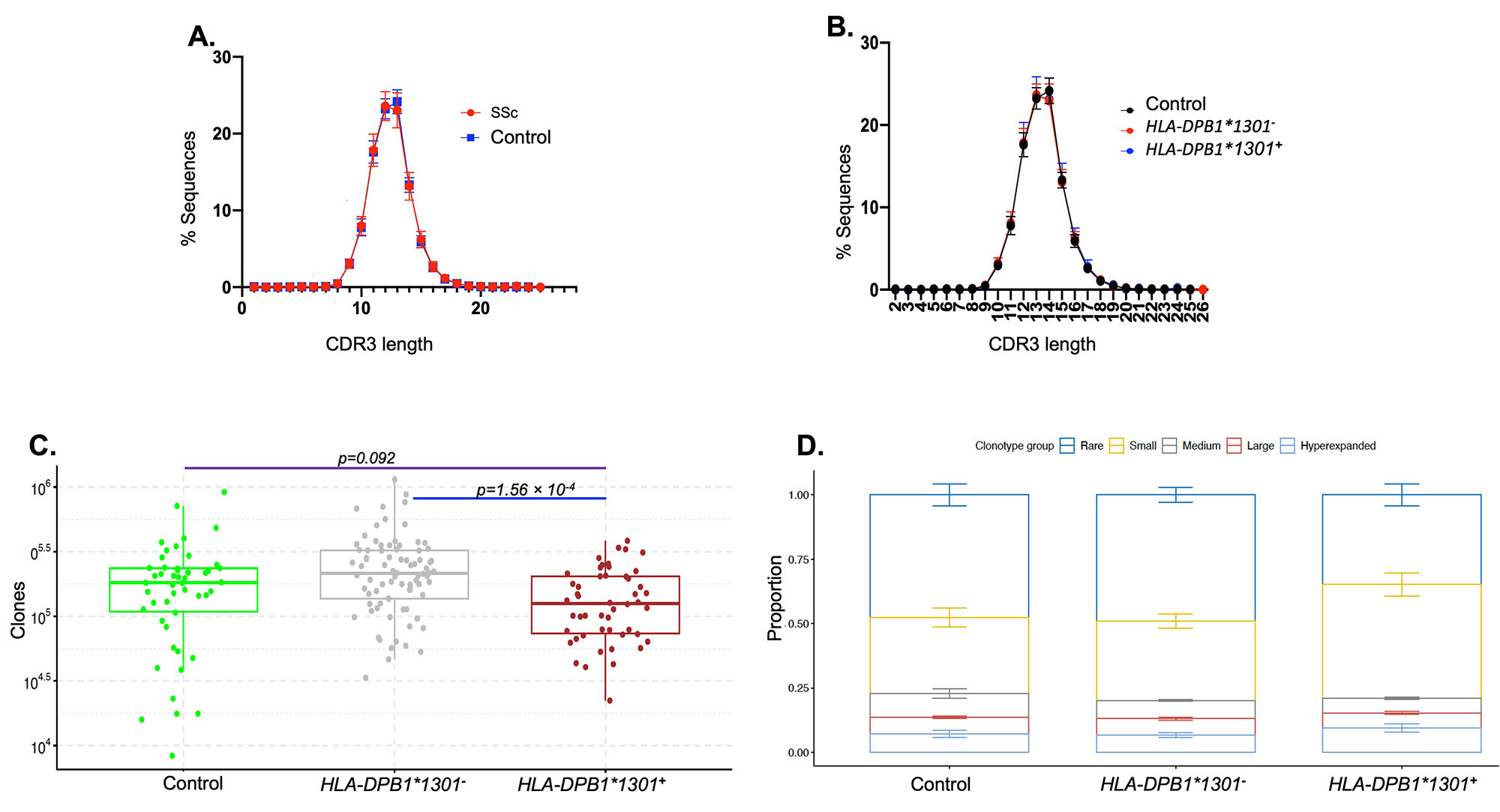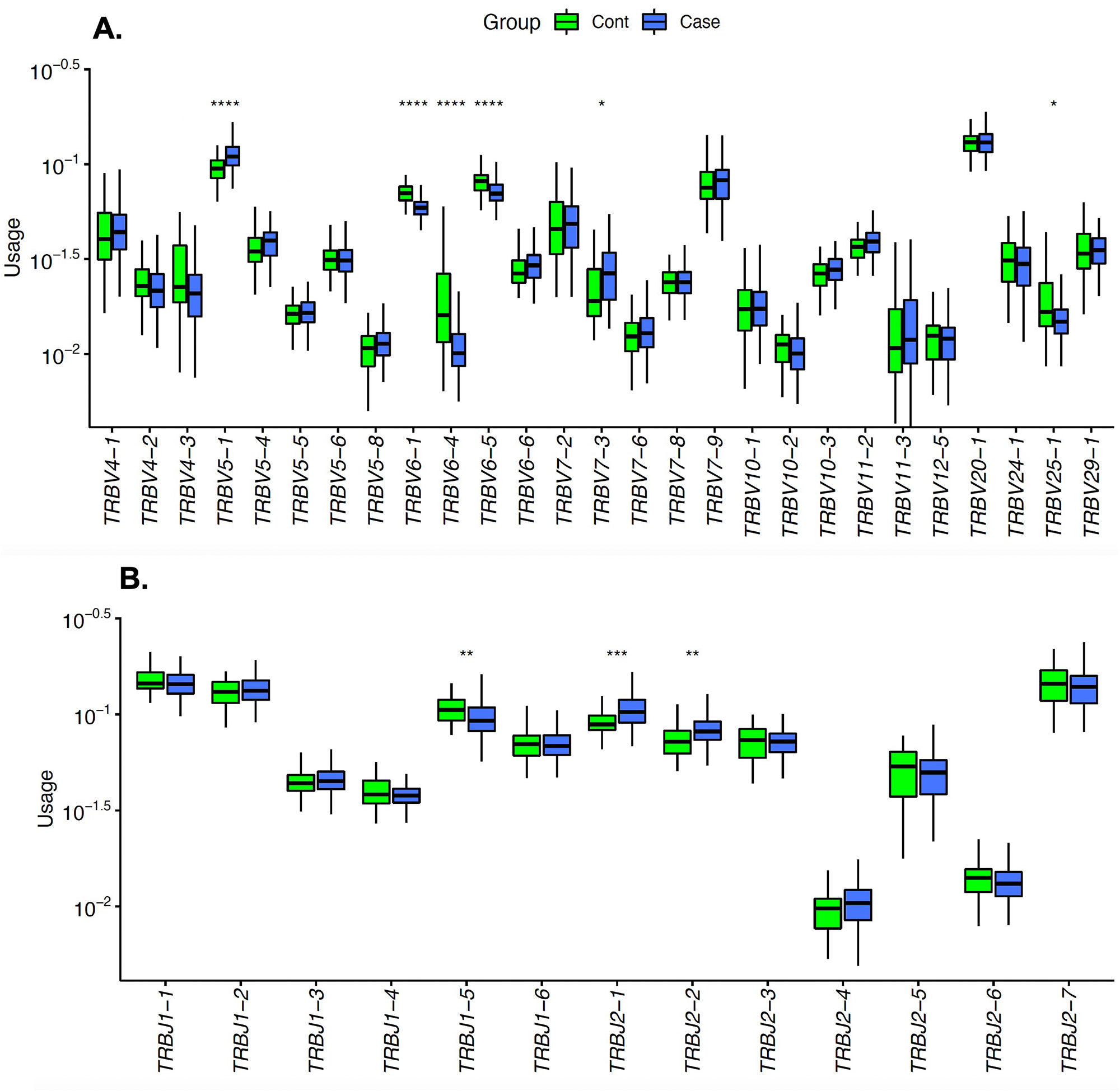Session Information
Date: Monday, November 14, 2022
Title: T Cell Biology and Targets in Autoimmune and Inflammatory Disease Poster
Session Type: Poster Session D
Session Time: 1:00PM-3:00PM
Background/Purpose: Systemic sclerosis (SSc) is an autoimmune, fibrotic disorder that disproportionately affects African Americans (AA). Previous work from our lab and others has suggested a pivotal role of HLA-II genes in SSc pathogenesis. HLA-II alleles encode for variations in antigen binding grooves of HLA proteins that present antigens to T-cell receptors (TCRs) and can contribute to antigen-specific immune responses. The TCR repertoire is HLA-restricted, antigen-specific, and recognizes antigens presented by HLA proteins. In this study, we explored the diversity of the hypervariable complementarity determining region 3 (CDR3) and TCR repertoire in SSc patients. We also examined the role of HLA-II alleles, especially HLA-DPB1*13:01, in the selection of the specific sequence and amino acid composition of the TCR in SSc patients.
Methods: Genomic DNA from 132 AA SSc patients from the GRASP consortium along with 50 AA healthy control samples were extracted and the TCRβ chain was deep sequenced using the immunoSEQ assay (Adaptive Biotechnologies, USA). Data was analyzed using Immunarch to identify differences in unique clones, CDR3 length, V gene usage, J gene usage, and amino acid usage in the FG-Loop of the TCRβ chain between the two SSc groups. Benjamini Hochberg FDR was used to correct for multiple testing.
Results: The CDR3 length was similar between SSc patients and controls (Figure 1A, B). The TCRβ repertoire was clonally expanded in HLA-DPB1*13:01+ SSc patients as compared to patients who did not carry this allele (Figure 1C). The proportion of small and hyperexpanded TCRβ clonotypes was increased in HLA-DPB1*13:01+ SSc patients (Figure 1D). Analysis of V gene and J gene usage identified statistically significantly increased usage of TRBV5-1, TRBV7-3, TRBJ2-1, and TRBJ2-2 genes and a decreased usage of TRBV6-1, TRBV6-4, TRBV6-5, TRBV25-1, and TRBJ1-5 genes in SSc patients compared to controls and the differences were statistically significant (Figure 2A, B). Overall amino acid usage of the FG loop of the TCRβ chain (antigen binding region) identified increased usage of hydrophobic amino acids, leucine and valine, and reduced usage of negatively charged glutamine in the FG loop of SSc patients compared to controls. Positional amino acid usage analysis of the FG loop of the TCRβ chain revealed increased usage of leucine at position 108 with decreased usage of tyrosine, glutamine, and aspartate.
Conclusion: This is the first study to report an association between HLA-II alleles and specific CDR3 composition in SSc patients. We examined the TCRβ repertoire of a large number of AA SSc patients and identified differential V and J gene and FG-loop amino acid usage that correlated with the presence of a specific HLA-II allele. Hydrophobic amino acid usage in the FG loop of the TCRβ chain has been reported to increase the avidity of TCR-MHC interaction and increased autoreactivity. Based on our findings, we can hypothesize that the TCRβ sequences favored by the SSc-associated HLA-II alleles are involved in autoantigen recognition and autoimmunity. These results highlight the important role of HLA-II alleles and T cells in SSc pathogenesis.
To cite this abstract in AMA style:
Kaundal U, Borden C, Oguz C, Lu J, Stenson E, Shah A, Mayes M, Doumatey A, Bentley A, Shriner D, Domsic R, Medsger T, Ramos P, Silver R, Steen V, Varga J, Hsu V, Saketkoo L, Schiopu E, Khanna D, Gordon J, Criswell L, Gladue H, Derk C, Bernstein E, Bridges, Jr. S, Shanmugam V, Chung L, Kafaja S, Jan R, Trojanowski M, Goldberg A, Korman B, Chandrasekharappa S, Naz F, Dell'Orso S, Adeyemo A, Rotimi C, Remmers E, Boin F, Wigley F, Sun P, Kastner D, Gourh P. Systemic Sclerosis-Associated Class II HLA Alleles Restrict the Diversity of the CDR3 and the T Cell Receptor Repertoire in African American Patients [abstract]. Arthritis Rheumatol. 2022; 74 (suppl 9). https://acrabstracts.org/abstract/systemic-sclerosis-associated-class-ii-hla-alleles-restrict-the-diversity-of-the-cdr3-and-the-t-cell-receptor-repertoire-in-african-american-patients/. Accessed .« Back to ACR Convergence 2022
ACR Meeting Abstracts - https://acrabstracts.org/abstract/systemic-sclerosis-associated-class-ii-hla-alleles-restrict-the-diversity-of-the-cdr3-and-the-t-cell-receptor-repertoire-in-african-american-patients/


